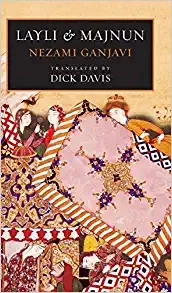Reading Time
4 hrs 21 mins
How long to read Layli and Majnun?
The estimated word count of Layli and Majnun is 65,100 words.
A person reading at the average speed of 250 words/min, will finish the book in 4 hrs 21 mins. At a slower speed of 150 words/min, they will finish it in 7 hrs 14 mins. At a faster speed of 450 words/min, they will finish it in 2 hrs 25 mins.
| Layli and Majnun - 65,100 words | ||
|---|---|---|
| Reading Speed | Time to Read | |
| Slow | 150 words/min | 7 hrs 14 mins |
| Average | 250 words/min | 4 hrs 21 mins |
| Fast | 450 words/min | 2 hrs 25 mins |
- Authors
-
Nezami GanjaviDick Davis
More about Layli and Majnun
65,100 words
Word Count
for Layli and Majnun
320 pages
Pages
7 hours
Audiobook length
Description
We know, because of the rhyme, that Nezami pronounced his heroine's name as Layli in Persian with the double "ee" sound as in "sweet," rather than the Arabic Layla, which is more commonly used for the name in English. For its subtlety, inventiveness, and dramatic force, the verse of the twelfth-century Persian poet Nezami has been compared to that of Shakespeare, and in the same way that Shakespeare's Romeo and Juliet has become the archetypal Western love story, so Nezami's Layli and Majnun occupies an equally uncontested place as the iconic love story of the Middle East.The works have many similarities besides their central status in their respective cultures: in both, the lovers are thwarted by their families' opposition; in both, the heroine's family chooses another husband for her; in both, the vehemence of the lovers emotion wreaks social havoc and leads to their deaths. But where Romeo and Juliet's love is characterized by its precipitous speed, that of Layli and Majnun lasts a lifetime, and where Shakespeare gives us a blaze of incandescent adolescent passion, Nezami weaves a tale of prolonged absence, ascetic denial, and spiritual longing, as well as of man's paradoxical relationship with the wilderness as the place where the amenities of civilization are replaced by the soul's solitary confrontation with its own essential needs and nature. Because of its emphasis on asceticism and absence, Nezami's masterpiece has often been interpreted as an allegory of Sufi aspiration, and much of the richness of his telling of the tale lies in the way that it blends the psychology of erotic longing with that of spiritual self-denial, so that the poem can be read simultaneously as a tale of tragically thwarted lovers and as a mystical renunciation of the physical world and of everyday human society. Dick Davis is an accomplished poet and scholar; he is also the finest translator of Persian poetry. With Layli and Majnun, he brings Nezami's classic to life for the first time in brilliant and moving English verse that captures all the extraordinary power and ingenuity of the original poem. Meanwhile, an introduction and copious explanatory notes shed a fascinating light on Nezami's life and work, and the astonishing virtuosity of his poetic style, that help set the stage for the reader's enjoyment of this tour de force of Persian literature.
